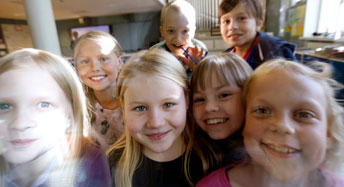Basic education

Basic education comprises 9 years of comprehensive school free of charge. Teaching is organised in a local school or another suitable location, ensuring that school journeys are as safe and short as possible. Teaching staff must work in cooperation with the home.
Basic education may include a single set of preparatory education (TUVA), which combines former year 10 studies, preparatory education for general upper secondary education (LUVA), and preparatory education and training for vocational education and training (VALMA).
Local authorities and the State are responsible for organising basic education. The State contributes towards the costs related to basic education by means of central government transfers to education providers as provided in the Act on Central Government Transfers to Local Government for Basic Public Services. Regional State Administrative Agencies provide guidance on matters related to the legal protection of pupils.
The Ministry of Education and Culture drafts legislation that applies to education and the budget proposals and Government resolutions related to this legislation.
Arrangements and organisation of teaching
Teaching and teaching equipment are available to pupils free of charge. Additionally, pupils are provided a warm meal every day at school.
Pupils have the right to free transport or to a sufficient subsidy to help cover the costs of transport to school, if the journey is over five kilometres in distance or if the route is too difficult, stressful or dangerous for pupils to travel on their own. The local authority or other education provider can also choose to offer a broader right to transport than that which is required by law.
The school year comprises 190 school days. The education provider makes decisions on the duration and timing of holidays. The school year for basic education begins on 1 August and ends on 31 July. The school year is divided into two parts: the autumn term and the spring term. School work for the school year ends on the last working day of the last week of May or first week of June. Any other decisions on holiday times are made by the education provider.
Basic education is part of completing compulsory education
Every child permanently residing in Finland must attend compulsory education. The guardian of a child, who must attend school, is responsible for ensuring the child completes compulsory education.
Compulsory education begins in the year during which a child turns seven and ends when they reach the age of 18 or when they complete an upper secondary qualification before the age of 18 (a matriculation examination or a vocational qualification) or when an equivalent qualification is gained abroad.
Teachers and qualifications
Class teachers normally teach years 1 to 6. Years 7 to 9 involves mainly subject-specific teaching, which is provided by subject teachers. As a rule, teachers have completed a Master's degree at a university.
Links to other websites
Finnish National Agency for Education: Education system: Basic education
Finnish National Agency for Education: Curricula and qualifications: Basic education
Finnish National Agency for Education: Curricula and qualifications: Education for immigrants
Regional State Administrative Agencies: Education and culture
Contact information
Heli Nederström, Senior Ministerial Adviser
Ministry of Education and Culture, Varhaiskasvatuksen, perusopetuksen ja vapaan sivistystyön osasto ( VAPOS ) Telephone:0295330122 Email Address: [email protected]

